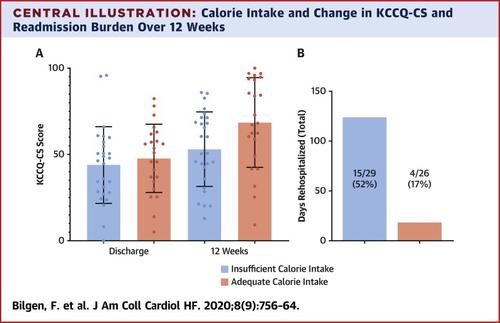JACC: Heart Failure ( IF 13.0 ) Pub Date : 2020-07-08 , DOI: 10.1016/j.jchf.2020.04.004 Feriha Bilgen 1 , Peiyu Chen 1 , Armella Poggi 1 , Joanna Wells 1 , Erika Trumble 2 , Stephen Helmke 3 , Sergio Teruya 3 , Tonimarie Catalan 1 , Hannah R Rosenblum 3 , Maria L Cornellier 1 , Wahida Karmally 3 , Mathew S Maurer 3 , Scott L Hummel 4

|
Objectives
The purpose of this study was to evaluate the relationship between calorie intake and post-discharge outcomes in hospitalized patients with heart failure (HF).
Background
Malnutrition increases adverse outcomes in HF, and dietary sodium restriction may inadvertently worsen nutritional intake.
Methods
In a dietary intervention trial, baseline nutritional intake in HF inpatients was estimated using the Block Food Frequency Questionnaire (FFQ), and the Nutritional Risk Index (NRI) was calculated. Insufficient calorie intake was defined as <90% of metabolic needs, and a 15-point micronutrient deficiency score was created. Adjusted linear, logistic, and negative binomial regression were used to evaluate associations between insufficient calorie intake and quality of life (using the Kansas City Cardiomyopathy Questionnaire Clinical Summary [KCCQ-CS]), readmission risk, and days rehospitalized over 12 weeks.
Results
Among 57 participants (70 ± 8 years of age; 31% female; mean body mass index 32 ± 8 kg/m2); median sodium and calorie intake amounts were 2,987 mg/day (interquartile range [IQR]: 2,160 to 3,540 mg/day) and 1,602 kcal/day (IQR: 1,201 to 2,142 kcal/day), respectively; 11% of these patients were screened as malnourished by the NRI. All patients consuming <2,000 mg/day sodium had insufficient calorie intake; this group also more frequently had dietary micronutrient and protein deficiencies. At 12 weeks, patients with insufficient calorie intake had less improvement in the KCCQ-CS score (β = −14.6; 95% confidence interval [CI]: −27.3 to −1.9), higher odds of readmission (odds ratio: 14.5; 95% CI: 2.2 to 94.4), and more days rehospitalized (incident rate ratio: 31.3; 95% CI: 4.3 to 229.3).
Conclusions
Despite a high prevalence for obesity and rare overt malnutrition, insufficient calorie intake was associated with poorer post-discharge quality of life and increased burden of readmission in patients with HF. Inpatient dietary assessment could improve readmission risk stratification and identify patients for nutritional intervention. (Geriatric Out of Hospital Randomized Meal Trial in Heart Failure [GOURMET-HF] NCT02148679)
中文翻译:

热量摄入不足会恶化出院后的生活质量并增加心力衰竭患者的再入院负担。
目标
本研究的目的是评估住院心力衰竭 (HF) 患者的卡路里摄入量与出院后结果之间的关系。
背景
营养不良会增加 HF 的不良后果,饮食钠限制可能会无意中恶化营养摄入。
方法
在一项饮食干预试验中,使用块状食物频率问卷 (FFQ) 估计了心衰住院患者的基线营养摄入量,并计算了营养风险指数 (NRI)。卡路里摄入不足被定义为<90%的代谢需求,并创建了15分的微量营养素缺乏评分。调整后的线性回归、逻辑回归和负二项回归用于评估热量摄入不足与生活质量(使用堪萨斯城心肌病问卷临床总结 [KCCQ-CS])、再入院风险和 12 周内再住院天数之间的关联。
结果
在 57 名参与者中(70 ± 8 岁;31% 女性;平均体重指数 32 ± 8 kg/m 2);钠和卡路里摄入量中位数分别为 2,987 毫克/天(四分位距 [IQR]:2,160 至 3,540 毫克/天)和 1,602 大卡/天(IQR:1,201 至 2,142 大卡/天);这些患者中有 11% 被 NRI 筛查为营养不良。所有钠摄入量<2,000 mg/天的患者热量摄入不足;该组的膳食微量营养素和蛋白质缺乏症也更为常见。在 12 周时,卡路里摄入不足的患者 KCCQ-CS 评分改善较少(β = -14.6;95% 置信区间 [CI]:-27.3 至 -1.9),再入院几率更高(优势比:14.5;95 % CI:2.2 至 94.4),以及更多的再住院天数(事件率比:31.3;95% CI:4.3 至 229.3)。
结论
尽管肥胖和罕见的明显营养不良患病率很高,但热量摄入不足与心衰患者出院后生活质量较差和再入院负担增加有关。住院饮食评估可以改善再入院风险分层并确定患者进行营养干预。(老年心力衰竭院外随机膳食试验 [GOURMET-HF] NCT02148679)


























 京公网安备 11010802027423号
京公网安备 11010802027423号